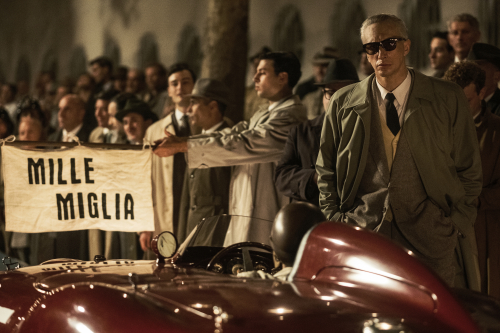
Lorenzo Sisti/Elevation Pictures
MOVIE REVIEW
Ferrari (2023)
Somehow Michael Mann has made a biopic of Enzo Ferrari (Adam Driver) that nonironically hits many of the biopic tropes parodied in “Walk Hard” – a parent bitter the wrong kid died, an unhappy marriage, the main enemy of the subject’s success being the subject himself. But in “Ferrari” none of this is funny; and the way in which the movie ends, which is broadly true to life, is so disturbing it’s almost impossible to fathom. Proponents of the philosophies of Ayn Rand are going to love this, which is not really a compliment. We know things will work out for Enzo because the movie exists, as does the Ferrari organization, but it’s unusually disturbing to realize that its story is about how a man achieved his success as the expense of many, many lives.
This is literal, those lives. All the deaths are shown, in gruesome and mercifully brief C.G.I. sequences, and their aftermath is left primarily to implication, possibly because allowing anything more direct would be too bleak for Hollywood. It’s 1957 and while Enzo is putting on a good front, he is in trouble. The car factory he owns is teetering on the edge of bankruptcy; and the town of which he is king relies on his factory for their jobs. He lunches with and makes motivational speeches to his racing crew (which includes Patrick Dempsey, Jack O’Connell and newcomer Gabriel Leone, none of whom are given the chance to make a true impression). He argues about business with his wife, Laura (a very good Penélope Cruz), and dines with his mistress, Lina (an equally good Shailene Woodley). Lina lives in a villa outside town and her son, Piero (Giuseppe Festinese) – Enzo’s son – is about to be confirmed, meaning the question of his surname can no longer be avoided. Will Enzo acknowledge Piero’s paternity? It’s not a simple question since, with the collusion of the entire town, he has kept Laura in the dark about his second family for over a decade. During that decade his son with Laura had a long illness which led to his death, from which she has not recovered. Enzo’s life is saturated with death, partially by choice, even as he greets his buyers and barks at journalists and strides around basking in his own glory. How will he keep moving forward?
Like a shark. Mr. Driver, playing nearly two decades older than his current age, here has his best role yet, allowing him to delve into his innate stubbornness and strangeness. But we see what Enzo does, though almost never why; both Ms. Cruz and Ms. Woodley do a better job of creating personal subtext than Mr. Driver. Ms. Cruz plays to type as an emotionally unstable woman – one who can shoot at her husband and provoke no more than eyerolling from the housekeeper – but it’s clear Laura is his equal in business, able to plan and strategize in a way which bankrolls the barely believable risks Enzo takes. Their partnership is remarkable because it’s clear how desperately they need each other, but it’s based on pain. Enzo does nothing about the sexism which keeps Laura from her true level in the business, while Laura has focused on her grief and presumed his absences are due to mere (but constant) tomcatting. Instead there is Lina, quietly accepting second place and never making a fuss. The movie treats this double selfishness of Enzo’s as a polite embarrassment, though the editing choice by Pietro Scalia to cut from a sex scene to one where Lina uses shears to cut plums from a tree adds a strangely sour note. It’s a very masculine attitude, to let your women express your feelings for you, but the combination of Lina’s stoicism and Laura’s savvy doesn’t explain Enzo himself, and neither does objectivism, which believes laissez-faire capitalism should empower its workers instead of slaughtering them.
Erik Messerschmidt, who also shot this year’s equally bleak “The Killer,” kept his camera hung back politely, as if getting too close might reveal a little too much. But the greatest weakness is Mr. Mann doesn’t seem to know how Enzo gets so many others to risk their lives for his living. The crews of “Heat” were so vividly defined that the deal the cops and the robbers had struck amongst themselves made perfect sense. The camaraderie and charisma in “Miami Vice” made their ride-or-die recklessness understandable. Even “Blackhat” – which is ripe for critical reassessment – made more sense than this. The “terrible joy” of racing is seen as having so much appeal that no further explanation is necessary. But if the action of the Ferrari business is the juice for racing crews, even for Laura, it isn’t shown.
This movie’s attitude is hardest to explain when it comes to all those deaths. It’s not callous; and it’s not indifferent; and it takes none of the disgusting glee so prevalent in the modern American blockbuster. But even as the bodies pile up, Enzo merely frowns before gliding over to speak to someone new; and Laura sighs before arranging for a salary to be stopped. But if it’s just another price of business, why have the quick scene at the lunch table? Even the most callous war movie normally does a better job of humanizing the soldiers in the line of fire. But we cannot ask the credited screenwriter, Troy Kennedy Martin, as he died in 2009.
Has this movie been fretted over and imagined for so long that its flaws were no longer apparent? Is the message that individual success equals the value of those who bled and died for it? Or are we simply meant to marvel that one man was able to keep a world-class business going in spite of all the carnage it was responsible for? It's a surprise that the main aftertaste of “Ferrari” is one of lingering unease.
Comments